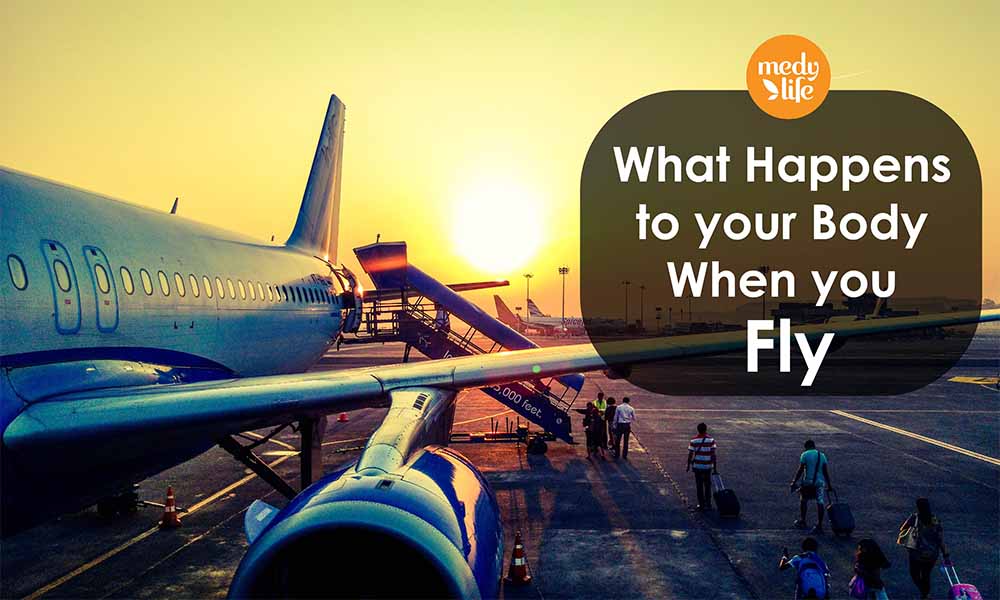
What Happens to your Body when you Fly?
10-07-2019 | Posted By: Shagun Parasher | 3446 View(s)
The one who said “it is the journey, not the destination, clearly was not travelling in a plane. While the plane journey is considered the best journey because of the time spent in travelling and safety of passengers, it is just not the jetlag that is caused but also certain issues that might happen to you and your Body when you fly. Things like oxygen deprivation, cosmic radiations, loss of taste, swollen ankles, bloated stomach and popped ears in pain are some common issues that happen when you are travelling in a plane. Let’s dig deeper and learn about these issues in detail. Read on to discover What Happens to your Body when you fly.

Things that can happen to your Body when you Fly
1. You temporarily Lose Taste
As per the study conducted by Lufthansa Airlines, our taste buds get numb as soon as the plane crosses 30 thousand feet. And so, the ability to perceive saltiness and sweetness drops by about 30 per cent when we are in the air. This is the reason why airline food is tasteless.
2. You become Dehydrated
Low humidity levels in an aeroplane can make males lose about 8.5 cups of water and females lose 6.8 cups of water on an average flight of 10 hours. Dehydration can be observed by dry patchy skin, chapped lips, severe headache, bloating and constipation. So all you got to do is drink plenty of water. Try to avoid water that has too sodium content in it, because it will ultimately make you thirsty with each passing minute. Although one thing you must keep in mind is that you should not drink more than 1-litre water in an hour. Drink more but in lesser quantities and not more than a litre or one and a half litre.
3. Dry Skin
Humidity is a key factor responsible for moisture balance in our skin. Our skin is the happiest when the humidity is between 40-70 per cent but in a plane flying at high altitudes. When there is no water in the air, skin gets dry, and our handy moisturisers do not work as well. In that case, you must grab products that contain hyaluronic acid.
4. You are more prone to become Sick
Wherever we go, germs follow. There is nowhere to run, nowhere to hide. E. coli, listeria and MRSA are common germs found in airports and on planes. Someone sick and sitting near you makes you 80 per cent more susceptible to getting ill. All thanks to the recycled plane air. People sitting in aisle seats are more exposed to germs than those in window seats. You can prevent sickness by using a hand sanitiser regularly using wipes to clean your seat.

5. Your Ankles Swell
Have you noticed if you sit for prolonged hours, that your feet swell up? A similar thing happens when you are on a plane. Because you sit for so long, your lower legs and ankles expand larger than their usual size by the time you reach your destination. If you are someone who gets swollen feet often, we might have a solution for you. You can try compression socks. Compression socks help by stimulating blood flow away from your feet and lower the risk of blood clots and deep vein thrombosis.
6. Radiation levels Shoot up
Your radiation level rises up but not enough to do any major harm. You might be exposed to radiation levels more than what you are exposed in a chest X-ray. This is not good for people who are regular travellers, for pilots and flight attendants.
7. Hypoxia
Oxygen partial pressure drops especially, in a flight cabin, leading to mild hypoxia, which can cause headaches in those highly susceptible. To stop a severe headache, or any other issue, take deep breaths.
8. Ears start to Pop
The popping sensation that happens in our ears when we travel is also experienced when the plane takes off or lands. This can be either painful or not. This happens when the air pressure in the environment differs from the air pressure in our middle ear. Air pressure changes rapidly as we ascend into the air or descend back onto land. What can be done to prevent this situation? You can chew gum or try to yawn often to counteract the effects of the altitude change, and your ears will return to normal.
9. Your mild toothache can turn into a Severe One
Continuous changes in pressure can turn your mild toothache if you have one, into a severe one. The air pressure in your Body must be equal to the air pressure in the cabin. However, there are instances where the air is trapped in your teeth and changes in pressure can make them hurt, and with that we mean, hurt bad. This can get worse if you recently got your teeth treated, have tooth decay or infection. All these factors leave a patch of air in your tooth and thus sensitivity and pain.
10. Your emotions Heighten Up
Don’t be judgemental if someone near you is weeping like a kid, or in fact, a kid is crying like anything near you. It is because of the heightened emotions that they cannot stop it.
11. Smelly Breath
Saliva production slows down at height, and that can act as a breeding ground for bacteria in your mouth and we all know bacteria stink really bad. Travelling makes it difficult to stick to our diet and so, most people tend to eat what tastes good i.e Sugary foods which contribute to this halitosis. If you do not wish to be one with bad breath, stay hydrated and try to abstain from unhealthy, junk food as much as you can.
12. Tolerance for Alcohol Plummets
If you are one of those who have had drinks on an aeroplane, then you must have also noticed that few drinks go a long way. You might feel more drunk or intoxicated on a plane than you usually get. So, if you don’t want to feel unpleasantly intoxicated in your journey, you must think before you go for another shot of vodka.
13. You get Gassy
It is often experienced by a lot of people and they complain about feeling gassy in a plane. According to a study by the University of Copenhagen, change in volume of intestinal gas occurs due to ever-changing and altered cabin pressure, which increase the amount of flatus in the Body. Have a snack, preferably something that will not add up to the flatus formation.
14. The risk of developing a Blood Clot increases
While travelling you might experience that your leg starts to cramp after a long fight. Not moving for long periods of time puts a person at the risk of developing blood clots in the deep veins of their legs. If this condition is not treated fast, then these blood clots can travel to the lungs and cause a potentially fatal pulmonary embolism. You should look for symptoms like swelling, pain and warm to touch red skin.
This was about issues that happen to your Body when you fly. We hope you like this article. Do consider consulting your doctor if you suffer from any medical condition or were recently ill, before travelling by air. Stay Fit, Stay Healthy.


